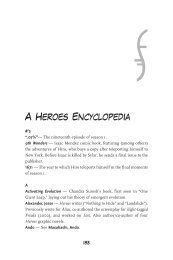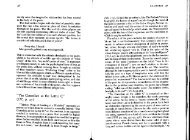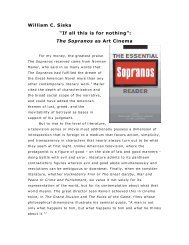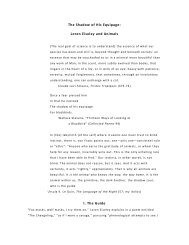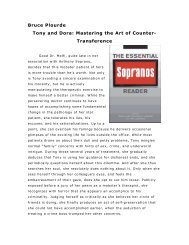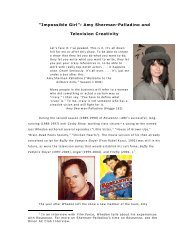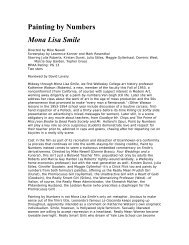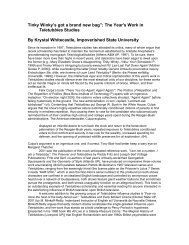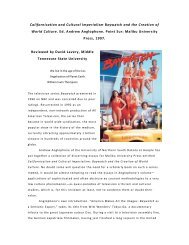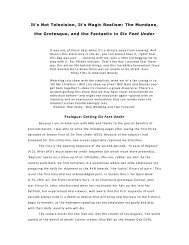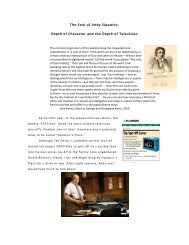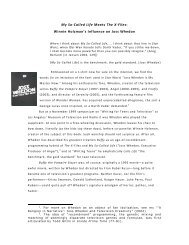Coming Heavy': Intertextuality and Genre on The ... - David Lavery
Coming Heavy': Intertextuality and Genre on The ... - David Lavery
Coming Heavy': Intertextuality and Genre on The ... - David Lavery
Create successful ePaper yourself
Turn your PDF publications into a flip-book with our unique Google optimized e-Paper software.
D E P T H<br />
<str<strong>on</strong>g>Coming</str<strong>on</strong>g> Heavy<br />
To really "make" it as a Sopranos watcher, come<br />
with your full breadth of cultural references or d<strong>on</strong>'t<br />
come at all<br />
by <strong>David</strong> <strong>Lavery</strong><br />
At this point in our cultural history, mob movies are classic<br />
American cinema, like westerns.<br />
- Jas<strong>on</strong> Le Penna (“<strong>The</strong> Legend of Tennessee Moltisanti,”<br />
Seas<strong>on</strong> One)<br />
<strong>The</strong> Sopranos - HBO<br />
As the orchestrator of <strong>The</strong> Sopranos' sustained aria of life,<br />
death, nursing-home limbo, suburban-neighborhood hell, <str<strong>on</strong>g>and</str<strong>on</strong>g> strip-club heaven, Chase has used<br />
televisi<strong>on</strong> in an unprecedented manner. Part of the immense pleasure of <strong>The</strong> Sopranos' debut<br />
seas<strong>on</strong> was watching the work of a man who'd mastered a new form: Chase spent 13 weeks<br />
crossing the miniseries with the soap opera, draining his fresh synthesis of those old genres' hokey<br />
melodrama, <str<strong>on</strong>g>and</str<strong>on</strong>g> then flooding it with vibrant humor, rage, psychoanalytic insight, <str<strong>on</strong>g>and</str<strong>on</strong>g> a good red<br />
wine to wash down all the pasta every<strong>on</strong>e is always eating.<br />
- Ken Tucker, Entertainment Weekly<br />
In “Meadowl<str<strong>on</strong>g>and</str<strong>on</strong>g>s,” a first seas<strong>on</strong> episode of HBO’s hit dramatic series <str<strong>on</strong>g>and</str<strong>on</strong>g> cultural phenomen<strong>on</strong> <strong>The</strong><br />
Sopranos, T<strong>on</strong>y Soprano visits the Sit Tite diner to make his displeasure known to his uncle, Carrado<br />
“Junior” Soprano, c<strong>on</strong>cerning a recent mock-hit <strong>on</strong> Christopher Moltisanti, <strong>on</strong>e of T<strong>on</strong>y’s soldiers.<br />
Having just attacked Mikey Palmice <strong>on</strong> the street with a staple gun (stolen during a visit to the<br />
hospital), T<strong>on</strong>y is in no mood for c<strong>on</strong>ciliati<strong>on</strong>, but neither is Junior, who warns his nephew not to<br />
return again unless he is armed: "Come heavy,” he insists, “or not at all."<br />
As a work of popular culture - the most important work of popular culture of the sec<strong>on</strong>d half of the<br />
20th century, <strong>The</strong> New York Times effused - <strong>The</strong> Sopranos “comes heavy,” if you will, in every<br />
episode, not just with weap<strong>on</strong>ry but with intertextuality <str<strong>on</strong>g>and</str<strong>on</strong>g> with genre accoutrements.<br />
“Any text that has slept with another text … has necessarily slept with all the texts the other text has<br />
slept with,” notes Robert Stam, author of Film <strong>The</strong>ory: An Introducti<strong>on</strong> (Blackwell, 2000), extending
a central premise of STD preventi<strong>on</strong> into the study of literature <str<strong>on</strong>g>and</str<strong>on</strong>g> film. Our times, by this logic, are<br />
clearly promiscuous. It is quite apparent that many of televisi<strong>on</strong>’s most ingenious series - rife as they<br />
are with intertextual references, often humorous, to movies, to culture in general, to literature, to (selfreferentially)<br />
themselves - come heavy as well. <strong>The</strong> predominance of the “already said,” as Umberto<br />
Eco <strong>on</strong>ce observed, is, after all, <strong>on</strong>e of postmodernism’s signatures.<br />
Often, the intertextuality of such shows c<strong>on</strong>tributes mightily to keeping a certain segment of the<br />
audience - flattered by “inclusi<strong>on</strong>-by-allusi<strong>on</strong>,” able to feel pride in the ability to get the references -<br />
still hooked, still watching. It was possible to follow Twin Peaks <str<strong>on</strong>g>and</str<strong>on</strong>g> not ever realize, for example,<br />
that a minor character, an insurance agent, had the same name as the Fred MacMurray character (also<br />
an insurance agent) in Double Indemnity.<br />
Northern Exposure entertained us even if we did not appreciate the full ramificati<strong>on</strong>s of Franz Kafka’s<br />
visit (in “Ciceley”) to an early 20th Century Alaska where his writer’s block is cured <str<strong>on</strong>g>and</str<strong>on</strong>g> idea for<br />
“Metamorphosis” receives a new inspirati<strong>on</strong>. Certainly <strong>The</strong> Simps<strong>on</strong>s is still funny even if we do not<br />
recognize that Principal Skinner’s “mother” lives in Norman Bates’ house from Psycho, or that<br />
virtually an entire episode replicates, in some cases shot-for-shot, Martin Scorsese’s remake of Cape<br />
Fear, with Sideshow Bob st<str<strong>on</strong>g>and</str<strong>on</strong>g>ing in for Max Cady.<br />
An exchange like the following, from the premiere of the fifth seas<strong>on</strong> of Buffy the Vampire Slayer - an<br />
episode in which the legendary Dracula himself comes to Sunnydale - is still witty even if we have<br />
never seen a Dracula movie or watched Sesame Street:<br />
Willow: Hi.<br />
XANDER: Nice. Look who's got a bad case of dark prince envy. (Behind him we see<br />
Buffy holding her stake, looking c<strong>on</strong>cerned)<br />
DRACULA: I have no interest in you. Leave us.<br />
XANDER: No, we're not going to (in Dracula's accent) "leave you." And where'd you<br />
get that accent, Sesame Street? (As the Count <strong>on</strong> Sesame Street) Vun, two, three -<br />
three victims. Mwa ha ha!<br />
<str<strong>on</strong>g>Intertextuality</str<strong>on</strong>g> in these complex televisual texts c<strong>on</strong>stitutes much more than mere icing <strong>on</strong> the cake. It<br />
is central to their often cult appeal. And it is central as well to (<str<strong>on</strong>g>and</str<strong>on</strong>g> perhaps inseparable from) the<br />
questi<strong>on</strong> of genre.<br />
<strong>The</strong> Sopranos comes heavier than most. A c<strong>on</strong>tinuing gangster series - fully, self-c<strong>on</strong>sciously, even<br />
hyper-c<strong>on</strong>sciously, mobbed-up - hybridized in the age of recombinant TV with a family drama<br />
(“Family - redefined” as HBO has it in <strong>on</strong>e ad; “Either <strong>on</strong>e family or the other will kill him,” as<br />
another puts it), its intertextuality reveals much about its genre. A partial catalogue of such moments<br />
would include, in no particular order:
Martin Scorsese is spotted at a movie theatre <str<strong>on</strong>g>and</str<strong>on</strong>g> hailed with praise for an ignored<br />
movie: “Kundun,” Christopher calls out, “I liked it” (“46 L<strong>on</strong>g,” Seas<strong>on</strong> One).<br />
A federal marshal named “McLuhan” puts in an appearance (“House Arrest,” Seas<strong>on</strong><br />
Two).<br />
AJ (Anth<strong>on</strong>y Junior) becomes deeply depressed after reading the existentialists at<br />
school (Sartre, Kierkegaard, Camus, Heidegger are evoked, <str<strong>on</strong>g>and</str<strong>on</strong>g> of course the<br />
German philosopher “Niche,” <str<strong>on</strong>g>and</str<strong>on</strong>g> an English teacher, of course, is blamed - al<strong>on</strong>g with<br />
the Internet) <str<strong>on</strong>g>and</str<strong>on</strong>g> learning that life is meaningless (“Death just shows the ultimate<br />
absurdity of life,” AJ remarks) (“D-Girl,” Seas<strong>on</strong> Two).<br />
T<strong>on</strong>y is compared to the Golem <str<strong>on</strong>g>and</str<strong>on</strong>g> then to Frankenstein (”Denial, Anger,<br />
Acceptance,” Seas<strong>on</strong> One).<br />
As Meadow Soprano watches a rerun of <strong>The</strong> Howling <strong>on</strong> TV while making out with a<br />
Puerto Rican boyfriend, a horrid metamorphosis taking place <strong>on</strong> screen reminds her,<br />
as she announces, of “Georgia O’Keefe!”(“I Dream of Jeanne Cusamano,” Seas<strong>on</strong><br />
One).<br />
Renée Zellweger is discussed, unfavorably (“College,” Seas<strong>on</strong> One).<br />
A popular Broadway musical is evaluated post-show by theatre critic Christopher<br />
Moltisanti: "Rent. Fucking Broadway musicals. I mean we're supposed to get all fuckin'<br />
weepy-eyed cause they turned off the heat in some guy's loft” (“A Hit is a Hit,” Seas<strong>on</strong><br />
One).<br />
“Juan Valdez has been separated from his d<strong>on</strong>key,” Paulie Walnuts announces in a<br />
ph<strong>on</strong>e call to T<strong>on</strong>y - code for a successful robbery of some Columbian drug dealers<br />
(“A Hit is a Hit,” Seas<strong>on</strong> One).<br />
<strong>The</strong> suicides of Kurt Cobain (“Boca,” Seas<strong>on</strong> One) <str<strong>on</strong>g>and</str<strong>on</strong>g> Ernest Hemingway (“<strong>The</strong><br />
Legend of Tennessee Moltisanti,” Seas<strong>on</strong> One) are evoked.<br />
Christopher’s pitifully illiterate attempts at writing a screenplay make him, in the eyes<br />
of his girl friend, “a regular Tennessee Williams.” His writing efforts, however, bring<br />
him to doubt the validity of his own life-plot. “Where’s my arc?” he begs to know from<br />
all who will listen, evoking the character arcs of Richard Kimble (<strong>The</strong> Fugitive) <str<strong>on</strong>g>and</str<strong>on</strong>g> the<br />
Keannu Reeves character Kevin Lomax in <strong>The</strong> Devil’s Advocate (“<strong>The</strong> Legend of<br />
Tennessee Moltisanti”).<br />
Later, taking an “Acting for Writers” class, Christopher becomes James Dean in a<br />
scene from Rebel Without a Cause (“Big Girls D<strong>on</strong>’t Cry,” Seas<strong>on</strong> Two). And he gives<br />
Janeane Garofalo <str<strong>on</strong>g>and</str<strong>on</strong>g> S<str<strong>on</strong>g>and</str<strong>on</strong>g>ra Bernhard obscene Italian dialogue advice (“D-Girl,”<br />
Seas<strong>on</strong> Two).
Viewing a DVD of Remains of the Day induces a paroxysm of guilt in Carmela<br />
Soprano over her acceptance of her husb<str<strong>on</strong>g>and</str<strong>on</strong>g>’s involvement in the Mafia, <str<strong>on</strong>g>and</str<strong>on</strong>g> helps to<br />
prevent a priest’s attempted seducti<strong>on</strong> of her (“College,” Seas<strong>on</strong> One).<br />
Masada is evoked by a Hasidic Jew whose bris is about to be finished by T<strong>on</strong>y’s gang<br />
in order to ensure his cooperati<strong>on</strong> (“Denial, Anger, Acceptance,” Seas<strong>on</strong> One).<br />
In a bizarre dream of Dr. Melfi’s, T<strong>on</strong>y dies in a horrible head-<strong>on</strong> collisi<strong>on</strong> with a semi<br />
to the tune of a munchkin s<strong>on</strong>g (“Out of the Woods”) from Wizard of Oz (“Toodle-<br />
Fucking-oo,” Seas<strong>on</strong> Two).<br />
A hospital orderly seeking to prevent T<strong>on</strong>y’s verbal assault <strong>on</strong> his supposedly strokeaffected<br />
mother is called “George Clo<strong>on</strong>ey” <str<strong>on</strong>g>and</str<strong>on</strong>g> told to mind his own business (“I<br />
Dream of Jeannie Cusamano,” Seas<strong>on</strong> One).<br />
Carlos Castanada, quoted by Dr. Melfi, is mistaken for a boxer by T<strong>on</strong>y (“<strong>The</strong> Happy<br />
W<str<strong>on</strong>g>and</str<strong>on</strong>g>erer,” Seas<strong>on</strong> Two).<br />
Christopher, unhappy with slow service amid a mostly African American crowd in a<br />
restaurant, w<strong>on</strong>ders aloud, “What am I, Mark Fuhrman?” (“A Hit is a Hit,” Seas<strong>on</strong> One).<br />
After failing to whack T<strong>on</strong>y Soprano, two young African American hitmen are referred<br />
to as (1) “the Jamaican bobsled team” <str<strong>on</strong>g>and</str<strong>on</strong>g> (2) Boyz II Men (“Isabella,” Seas<strong>on</strong> One).<br />
As Big Pussy tries to locate AJ’s biology teacher’s missing Saturn, he laments that he<br />
feels “like Rockford here” - evoking a show that Sopranos creator <strong>David</strong> Chase wrote<br />
for (“46 L<strong>on</strong>g,” Seas<strong>on</strong> One).<br />
Sopranos intertextuality also includes the presence of numerous other “texts”: T<strong>on</strong>y’s Russian<br />
goomah, Irina, reads Chicken Soup for the Soul; when sent to c<strong>on</strong>vince Irina that she should forget<br />
about her sugar daddy, Sylvio cites Gail Sheehy’s Passages to buttress his argument; <str<strong>on</strong>g>and</str<strong>on</strong>g> Carmela is<br />
seen <strong>on</strong> several occasi<strong>on</strong>s reading Arthur L. Golden’s Memoirs of a Geisha (no doubt preparing for a<br />
future meeting of her book club - at <strong>on</strong>e of their meetings she <str<strong>on</strong>g>and</str<strong>on</strong>g> her fellow mob wives discuss Frank<br />
McCourt’s Tis: A Memoir).<br />
In its most brilliant intertextual flourish, <strong>The</strong> Sopranos as a commercial enterprise has spun off a<br />
“commodity intertext” (as such is now sometimes called) entitled <strong>The</strong> Sopranos: A Family History.<br />
<strong>The</strong> coffee-table guidebook claims to be the byproduct of the exhaustive research of organized crime<br />
expert Jeffrey Warwick - an actual character <strong>on</strong> the show who is seen discussing the mob <strong>on</strong> the local<br />
news in “<strong>The</strong> Legend of Tennessee Moltisanti.”<br />
"As the Bible is to Western thought,” <strong>David</strong> Chase, the real Jeffrey Warwick, proclaims <strong>on</strong> the HBO<br />
Web site with playful blasphemy, “so is <strong>The</strong> Sopranos: A Family History to the field of compani<strong>on</strong><br />
books!” (So far the book itself has not joined Memoirs of a Geisha as an <strong>on</strong>-screen presence, but it
well might. After all, Chase himself has appeared, Hitchcock-like, <strong>on</strong>-screen, sitting at an adjoining<br />
table in an outdoor cafe in Naples in “Commendatori” [Seas<strong>on</strong> Two].)<br />
Not surprisingly, references to gangster films abound:<br />
When (in “<strong>The</strong> Legend of Tennessee Moltisanti,” Seas<strong>on</strong> One) the counter boy at a<br />
bakery shows Christopher (Michael Imperioli) no respect, Christopher shoots him in<br />
the foot-revenge no doubt for what Tommy DeVito (Joe Pesci) did to Spider (also<br />
played by Imperioli) in GoodFellas (Tommy would, of course, later kill Spider). In<br />
similar fashi<strong>on</strong>, Lorraine Bracco whose portrayal of Karen Hill in GoodFellas brought<br />
her fame, plays Dr. Melfi in <strong>The</strong> Sopranos.<br />
A member of the posse of gangster rapper Massive Genius calls out to Christopher,<br />
“Yo, D<strong>on</strong>nie Brasco” (“A Hit is a Hit,” Seas<strong>on</strong> One).<br />
Paulie, recalling Edward G. Robins<strong>on</strong>’s last words from Little Caesar, proclaims mockdramatically,<br />
“Could this be the end of Ricco?” (“A Hit is a Hit,” Seas<strong>on</strong> One); <str<strong>on</strong>g>and</str<strong>on</strong>g><br />
while snorting coke in the brilliant opening m<strong>on</strong>tage of Seas<strong>on</strong> Two, Christopher,<br />
anxious to write a gangster film himself, watches the same movie <strong>on</strong> TV (“Guys Walks<br />
Into a Psychiatrist’s Office”).<br />
After being told that Hollywood is always looking for mob stories, bad first weekend<br />
numbers for Mickey Blue Eyes result in sudden disinterest in the genre (“D-Girl,”<br />
Seas<strong>on</strong> Two).<br />
It doesn’t take a rocket scientist, however, or Harold Bloom, to recognize that the central ancestor<br />
texts of <strong>The</strong> Sopranos are, of course, <strong>The</strong> Godfather films. Paulie drives a car with a horn that chimes<br />
the theme from <strong>The</strong> Godfather (“Nobody Knows Anything,” Seas<strong>on</strong> One). When T<strong>on</strong>y’s crew travels<br />
to Italy to negotiate European distributi<strong>on</strong> of carjacked merch<str<strong>on</strong>g>and</str<strong>on</strong>g>ise from Jersey (“Commendatori,”<br />
Seas<strong>on</strong> Two), they bring with them images of the old country largely based <strong>on</strong> Michael Corle<strong>on</strong>e’s<br />
idyll there in <strong>The</strong> Godfather after his hit <strong>on</strong> Sollozzo <str<strong>on</strong>g>and</str<strong>on</strong>g> Captain McCluskey. A tour of Jersey<br />
includes the restaurant where a mobster c<strong>on</strong>vinced Tommy Dorsey (with a gun down the throat) to<br />
release Frank Sinatra from his c<strong>on</strong>tract - a scene evoked in <strong>The</strong> Godfather (“D-Girl,” Seas<strong>on</strong> Two).<br />
Junior’s Livia-inspired attempted whack of T<strong>on</strong>y comes down, just like the hit <strong>on</strong> D<strong>on</strong> Corle<strong>on</strong>e in<br />
<strong>The</strong> Godfather, while the respective mob bosses are making a purchase in a street-side market<br />
(“Isabella,” Seas<strong>on</strong> One).<br />
T<strong>on</strong>y’s crew knows <strong>The</strong> Godfather films all too well. After Brendan Fill<strong>on</strong>e is whacked <strong>on</strong> Junior’s<br />
orders, Big Pussy sees the explanati<strong>on</strong> in Godfather I, <str<strong>on</strong>g>and</str<strong>on</strong>g> it leads to gangster semiotics <str<strong>on</strong>g>and</str<strong>on</strong>g> mise-enscéne<br />
analysis.<br />
Christopher: Brendan's dead. . . . Brendan's brains are floating in his bathtub.<br />
Message job through the eye. Mo Green special.<br />
Paulie: What you talking about, Mo Green?
Big Pussy: In One: Mo Green's eyes got too big for his stomach so they put a small<br />
caliber in his eye.<br />
Christopher: Fucking Mikey Palmice does their hits. . . .<br />
Paulie: In his glasses, you mean.<br />
Big Pussy: Glasses, eyes, why you quibbling with me? . . .<br />
Paulie: <strong>The</strong> eye is just how Francis framed the shot. For the shock value.<br />
(“Meadowl<str<strong>on</strong>g>and</str<strong>on</strong>g>s,” Seas<strong>on</strong> One)<br />
When Big Pussy returns after a mysterious disappearance, he craves a taste of Sylvio-does-Pacino<br />
(<str<strong>on</strong>g>and</str<strong>on</strong>g> Keat<strong>on</strong>).<br />
Big Pussy: Hey, Sil?<br />
Sylvio: What? "What."<br />
Big Pussy: I've been g<strong>on</strong>e a l<strong>on</strong>g time, let me hear it.<br />
Sylvio: "Just when I thought I was out, they pull me back in.” "All right, just this <strong>on</strong>e<br />
time. I'll let you ask me about my affairs." "Is it true, Michael?" "No." "You fuck!" "Our<br />
true enemy has yet to reveal himself."<br />
T<strong>on</strong>y: He's <strong>on</strong> a roll! I gotta get the fuck out of here. (“Guy Walks Into A Psychiatrist's<br />
Office,” Seas<strong>on</strong> Two)<br />
And when, at the end of the sec<strong>on</strong>d seas<strong>on</strong>, Big Pussy’s betrayal of T<strong>on</strong>y is revealed in a remarkable<br />
dream sequence, his destiny to “sleep with the fishes” is announced, of course, by a fish:<br />
Talking Fish (Big Pussy's voice): Hey, T<strong>on</strong>'. How's it going?<br />
T<strong>on</strong>y: You didn't get sick?<br />
Talking Fish: Nah.<br />
T<strong>on</strong>y: How much you weigh?<br />
Talking Fish: Eight pounds. Lost a lot of weight. Swimming. <strong>The</strong> best exercise. Works<br />
every muscle group.
T<strong>on</strong>y: Get the fuck out of here. You never exercised <strong>on</strong>ce in your life.<br />
Talking Fish: Anyway, four dollars a pound. You know I've been working with the<br />
government right, T<strong>on</strong>'?<br />
T<strong>on</strong>y: D<strong>on</strong>'t say it.<br />
Talking Fish: C'm<strong>on</strong>, T<strong>on</strong>'. So<strong>on</strong>er or later you gotta face facts.<br />
T<strong>on</strong>y: I d<strong>on</strong>'t want to hear it.<br />
Talking Fish: Well, you're g<strong>on</strong>na hear it. Fuck. You passed me over for promoti<strong>on</strong>,<br />
T<strong>on</strong>', you knew.<br />
T<strong>on</strong>y: How much shit you give them?<br />
Talking Fish: A lot.<br />
T<strong>on</strong>y: Jesus, Puss.<br />
Talking Fish: Fuck of a way for it all to end, huh?<br />
T<strong>on</strong>y: Yeah. Yeah.<br />
Talking Fish: <strong>The</strong>se guys, <strong>on</strong> either side of me, they're asleep.<br />
T<strong>on</strong>y: D<strong>on</strong>'t say that. It's not fucking funny. I d<strong>on</strong>'t want to see you floppin' around<br />
down there! (“Funhouse,” Seas<strong>on</strong> Two)<br />
In a piece <strong>on</strong> pop culture references within <strong>The</strong> Sopranos, Mike Ant<strong>on</strong>ucci suggests that the net effect<br />
of the series’ many allusi<strong>on</strong>s is to complicate its central questi<strong>on</strong>: “Is this a show about them being<br />
like us, or us being like them?” Similarly, Ken Tucker has observed in Entertainment Weekly that<br />
Sopranos intertextuality has troubling genre implicati<strong>on</strong>s: “One of the myriad greatnesses of <strong>The</strong><br />
Sopranos,” Tucker writes, “is that, to paraphrase the Godfather paraphrase that Steven Van Z<str<strong>on</strong>g>and</str<strong>on</strong>g>t's<br />
Silvio frequently quotes, it keeps pulling you back in - back in <strong>on</strong> yourself, appealing to your basest<br />
instincts, to your fundamental urge to hear a bloody story well told.” <strong>The</strong> gangster genre has always<br />
been about ambivalence, about our guilty identificati<strong>on</strong> with its characters <str<strong>on</strong>g>and</str<strong>on</strong>g> acti<strong>on</strong>, <str<strong>on</strong>g>and</str<strong>on</strong>g> in <strong>The</strong><br />
Sopranos, as in the finest examples of the genre, narrative wins out over morality or political<br />
correctness.<br />
As Thomas Schatz shows in Hollywood <str<strong>on</strong>g>Genre</str<strong>on</strong>g>s (R<str<strong>on</strong>g>and</str<strong>on</strong>g>om House, 1981), genres have a life course,<br />
evolving through four distinct stages:<br />
an experimental stage, during which its c<strong>on</strong>venti<strong>on</strong>s are isolated <str<strong>on</strong>g>and</str<strong>on</strong>g> established, a
classic stage, in which the c<strong>on</strong>venti<strong>on</strong>s reach their “equilibrium” <str<strong>on</strong>g>and</str<strong>on</strong>g> are mutually<br />
understood by artist <str<strong>on</strong>g>and</str<strong>on</strong>g> audience, an age of refinement, during which certain formal<br />
<str<strong>on</strong>g>and</str<strong>on</strong>g> stylistic details embellish the form, <str<strong>on</strong>g>and</str<strong>on</strong>g> finally a baroque (or “mannerist,” or<br />
“self-reflexive”) stage, when the form <str<strong>on</strong>g>and</str<strong>on</strong>g> its establishments are accented to the<br />
point where they “themselves become the “substance” or “c<strong>on</strong>tent” of the work.<br />
Understood in these terms, movies like Little Caesar (Mervyn Leroy, 1930) <str<strong>on</strong>g>and</str<strong>on</strong>g> Public Enemy<br />
(William Wellman, 1931) represent the gangster film in its experimental stage; Godfather I <str<strong>on</strong>g>and</str<strong>on</strong>g> II<br />
(Francis Ford Coppola, 1972 <str<strong>on</strong>g>and</str<strong>on</strong>g> 1974) are classic examples of the classic stage; <str<strong>on</strong>g>and</str<strong>on</strong>g> Miller’s<br />
Crossing (Joel <str<strong>on</strong>g>and</str<strong>on</strong>g> Ethan Coen, 1990) represents w<strong>on</strong>derfully the age of refinement. <strong>The</strong> Sopranos is<br />
clearly baroque, <str<strong>on</strong>g>and</str<strong>on</strong>g> yet ...<br />
Have a look at Robert Warshow’s classic comparis<strong>on</strong> of the gangster film <str<strong>on</strong>g>and</str<strong>on</strong>g> the western, from his<br />
essay “Movie Chr<strong>on</strong>icle: <strong>The</strong> Westerner” published in Film <strong>The</strong>ory <str<strong>on</strong>g>and</str<strong>on</strong>g> Criticism (Oxford, 1992) <str<strong>on</strong>g>and</str<strong>on</strong>g><br />
summarized in the following table:<br />
<strong>The</strong> Gangster Film <strong>The</strong> Western<br />
A “story of enterprise <str<strong>on</strong>g>and</str<strong>on</strong>g> success ending in<br />
precipitate failure" (453).<br />
A romantic tragedy about a man “whose<br />
defeat springs with almost mechanical<br />
inevitability from the outrageous presumpti<strong>on</strong><br />
of his dem<str<strong>on</strong>g>and</str<strong>on</strong>g>s: the gangster is bound to go <strong>on</strong><br />
until he is killed” (458).<br />
A tale of the city. A tale of the fr<strong>on</strong>tier.<br />
<strong>The</strong> gangster is "without culture, without<br />
manners, without leisure" (453).<br />
<strong>The</strong> gangster is "l<strong>on</strong>ely <str<strong>on</strong>g>and</str<strong>on</strong>g> melancholy."<br />
<strong>The</strong> gangster is "expansive <str<strong>on</strong>g>and</str<strong>on</strong>g> noisy,” not<br />
introspective.<br />
A story of a man's struggle to retain his h<strong>on</strong>or,<br />
even in defeat<br />
A classical tragedy based <strong>on</strong> a hero of virtue<br />
always prepared for defeat; need not end in the<br />
death of the hero.<br />
<strong>The</strong> Western hero is a figure of repose.<br />
<strong>The</strong> Western hero is also l<strong>on</strong>ely <str<strong>on</strong>g>and</str<strong>on</strong>g><br />
melancholy, but out of a profound worldly<br />
wisdom,” the 'simple' recogniti<strong>on</strong> that life is<br />
unavoidably serious."<br />
<strong>The</strong> Western hero is "organically"<br />
introspective; he has to do what he has to do<br />
(457).
<strong>The</strong> gangster is violent in both his attracti<strong>on</strong>s<br />
<str<strong>on</strong>g>and</str<strong>on</strong>g> repulsi<strong>on</strong>s; he may lose c<strong>on</strong>trol at any<br />
time.<br />
<strong>The</strong> gangster is never satisfied; complacency<br />
is fatal to him.<br />
<strong>The</strong> gangster is always trying to get ahead;<br />
always wanting to own something more,<br />
c<strong>on</strong>quer some new territory.<br />
"Every<strong>on</strong>e wants to kill him <str<strong>on</strong>g>and</str<strong>on</strong>g> eventually<br />
some<strong>on</strong>e will” (454).<br />
<strong>The</strong> gangster does not seem to need love in<br />
any traditi<strong>on</strong>al sense.<br />
<strong>The</strong> gangster associates with prostitutes <str<strong>on</strong>g>and</str<strong>on</strong>g><br />
"loose" women because of their "passive<br />
availability" <str<strong>on</strong>g>and</str<strong>on</strong>g> their “costliness.”<br />
<strong>The</strong> gangster's possessi<strong>on</strong>s are central to his<br />
being; he owns things in a gaudy,<br />
exhibiti<strong>on</strong>istic way.<br />
<strong>The</strong> gangster's death reveals his whole life to<br />
have been a mistake.<br />
A modern genre which "c<strong>on</strong>fr<strong>on</strong>ts industrial<br />
society <strong>on</strong> its own ground" (465).<br />
<strong>The</strong> Western hero avoids violence at all cost;<br />
he is always in c<strong>on</strong>trol.<br />
<strong>The</strong> Western hero is complete within himself,<br />
self-c<strong>on</strong>tained.<br />
<strong>The</strong> Western hero has no desire to get<br />
anywhere.<br />
<strong>The</strong> Western hero is also under customarily<br />
"under fire" but would avoid it if he could.<br />
<strong>The</strong> Western hero does not seek love, is<br />
"prepared to accept it, but . . . never asks of it<br />
more than it can give"; love seems "at best an<br />
irrelevance"; the woman the Western hero<br />
loves (usually from the East) does not<br />
underst<str<strong>on</strong>g>and</str<strong>on</strong>g> what he does <str<strong>on</strong>g>and</str<strong>on</strong>g> he is incapable<br />
of explaining it to her.<br />
<strong>The</strong> Western hero associates with prostitutes<br />
(like Miss Kitty) because they underst<str<strong>on</strong>g>and</str<strong>on</strong>g> him.<br />
<strong>The</strong> Western hero owns nothing, or seems not<br />
to; m<strong>on</strong>ey, possessi<strong>on</strong>s, a house, a regular<br />
place to sleep, all seem alien to him.<br />
Even in death, the Western hero retains his<br />
h<strong>on</strong>or.<br />
Essentially "archaic" (466).<br />
For the most part, <strong>The</strong> Sopranos, a story still in progress with an arc still not clearly discernible,<br />
enacts the basic motifs Warshow delineates. T<strong>on</strong>y is "without culture, without manners, without<br />
leisure" (though he does watch <strong>The</strong> History Channel). He is "l<strong>on</strong>ely <str<strong>on</strong>g>and</str<strong>on</strong>g> melancholy” (even <strong>on</strong><br />
Prozac). He is violent in both his attracti<strong>on</strong>s <str<strong>on</strong>g>and</str<strong>on</strong>g> repulsi<strong>on</strong>s <str<strong>on</strong>g>and</str<strong>on</strong>g>, despite his announced desire to Dr.<br />
Melfi to be in “total c<strong>on</strong>trol,” loses c<strong>on</strong>trol at any time, both from anxiety attacks <str<strong>on</strong>g>and</str<strong>on</strong>g> in fits of rage.
He is insatiable; every<strong>on</strong>e wants to kill him - including his uncle, his mother <str<strong>on</strong>g>and</str<strong>on</strong>g> the late Richie<br />
Aprile. He associates with prostitutes <str<strong>on</strong>g>and</str<strong>on</strong>g> “loose” (<str<strong>on</strong>g>and</str<strong>on</strong>g> kept) women. He owns <str<strong>on</strong>g>and</str<strong>on</strong>g> possesses in<br />
garish, exorbitant fashi<strong>on</strong>.<br />
Writing in the 1950s, Warshow had recognized that the gangster film in its pure form had already<br />
begun to morph, so it should not surprise us that <strong>The</strong> Sopranos - a cable-televisi<strong>on</strong> c<strong>on</strong>tinuing, multiseas<strong>on</strong><br />
series - should deviate from the norm. Its divergences are, however, revealing. For instance, as<br />
in the classic gangster tale, <strong>The</strong> Sopranos is a tale of the city, but as its opening credit sequence -<br />
T<strong>on</strong>y’s drive from New York, through urban north Jersey, to his wealthy subdivisi<strong>on</strong> - reminds us in<br />
each episode, it is a tale of suburbia as well.<br />
T<strong>on</strong>y Soprano is "expansive <str<strong>on</strong>g>and</str<strong>on</strong>g> noisy” AND introspective. In <strong>on</strong>e of his noisiest moments, at the end<br />
of “Boca” (Seas<strong>on</strong> One), T<strong>on</strong>y is under the influence of a dangerous combinati<strong>on</strong> of alcohol <str<strong>on</strong>g>and</str<strong>on</strong>g> Dr.<br />
Melfi-prescribed chemicals. He stumbles around his own living room ruminating <strong>on</strong> his decisi<strong>on</strong> not<br />
to whack the Verbum Dei girls’ soccer coach <str<strong>on</strong>g>and</str<strong>on</strong>g> statutory rapist. “I didn’t hurt any<strong>on</strong>e!” he<br />
proclaims in celebrati<strong>on</strong> to a c<strong>on</strong>fused Carmela. It is safe to say that no other gangster in the history of<br />
the genre could have managed this degree of introspective pride in n<strong>on</strong>-violence.<br />
And unlike the classic gangster, T<strong>on</strong>y does seem to need love - the love of his wife <str<strong>on</strong>g>and</str<strong>on</strong>g> children <str<strong>on</strong>g>and</str<strong>on</strong>g><br />
the love he never received from his own deeply dysfuncti<strong>on</strong>al mother. Perhaps most significantly, we<br />
do not yet know whether T<strong>on</strong>y will die a typical gangster's death - a fate that will c<strong>on</strong>firm the great<br />
mistake of his life. Is it possible that T<strong>on</strong>y can survive the “mechanical inevitability” that springs<br />
“from the outrageous presumpti<strong>on</strong> of his dem<str<strong>on</strong>g>and</str<strong>on</strong>g>s”? Will <strong>The</strong> Sopranos’ “story of enterprise <str<strong>on</strong>g>and</str<strong>on</strong>g><br />
success” end “in precipitate failure”? Perhaps Seas<strong>on</strong> Three, now about to begin, will answer such<br />
questi<strong>on</strong>s, or at least take us closer to the answers.<br />
A psychiatrist who momentarily replaces Dr. Melfi in the first episode of Seas<strong>on</strong> Two rejects T<strong>on</strong>y as<br />
a patient <strong>on</strong> the grounds that he saw Analyze This <str<strong>on</strong>g>and</str<strong>on</strong>g> fears similar repercussi<strong>on</strong>s. “But that was a<br />
comedy,” T<strong>on</strong>y resp<strong>on</strong>ds, becoming a genre critic. We do not yet know whether <strong>The</strong> Sopranos might<br />
turn out to be <strong>on</strong>e as well, not just as <strong>on</strong>e of the most wickedly funny <strong>on</strong> televisi<strong>on</strong> - which it is<br />
already - but in the classical sense: as a drama which has a happy ending.<br />
<strong>David</strong> <strong>Lavery</strong> is a professor of English at Middle Tennessee State University, where he teaches<br />
courses in popular culture, film studies <str<strong>on</strong>g>and</str<strong>on</strong>g> science ficti<strong>on</strong>. He is the author of Late for the Sky: <strong>The</strong><br />
Mentality of the Space Age (1992) <str<strong>on</strong>g>and</str<strong>on</strong>g> editor/co-editor of Full of Secrets: Critical Approaches to<br />
Twin Peaks (1994); Deny All Knowledge: Reading <strong>The</strong> X-Files (1996); <str<strong>on</strong>g>and</str<strong>on</strong>g> Twin Peaks in the<br />
Rearview Mirror: Appraisals <str<strong>on</strong>g>and</str<strong>on</strong>g> Reappraisals of the Show that Was Supposed to Change TV <str<strong>on</strong>g>and</str<strong>on</strong>g><br />
(with Rh<strong>on</strong>da V. Wilcox) Fighting the Forces: Essays <strong>on</strong> the Meaning of Buffy the Vampire Slayer<br />
(both forthcoming from Wayne State University Press <str<strong>on</strong>g>and</str<strong>on</strong>g> Rowman <str<strong>on</strong>g>and</str<strong>on</strong>g> Littlefield, respectively). He<br />
has also begun to assemble a book of essays <strong>on</strong> <strong>The</strong> Sopranos. His review of <strong>The</strong> Sopranos: A<br />
Family History was published in Televisi<strong>on</strong> Quarterly (Winter 2001).
Enter the Pop Forum<br />
Comment <strong>on</strong> this article or<br />
start your own discussi<strong>on</strong><br />
Related Sites<br />
For more <strong>on</strong> the history <str<strong>on</strong>g>and</str<strong>on</strong>g> theories of intertextuality, visit Daniel Ch<str<strong>on</strong>g>and</str<strong>on</strong>g>lers page <strong>on</strong> semiotics for<br />
beginners.<br />
Need more of <strong>The</strong> Sopranos? <strong>The</strong> HBO store sells t-shirts, shot glasses, <str<strong>on</strong>g>and</str<strong>on</strong>g> the definitive book,<br />
<strong>The</strong> Sopranos: A Family History. A comprehensive site for Sopranos fans, Sopranol<str<strong>on</strong>g>and</str<strong>on</strong>g>, features<br />
transcripts of each episode. <strong>The</strong> Godfather Trilogy bills itself as "the site you can't refuse."<br />
Caryn James of <strong>The</strong> New York Times writes in her preview of the new seas<strong>on</strong> that the new<br />
episodes "suggest why <strong>The</strong> Sopranos has such wide appeal: it lives at the juncture where pop<br />
culture <str<strong>on</strong>g>and</str<strong>on</strong>g> high art meet."<br />
New Jersey Online is promoting its Sopranos c<strong>on</strong>necti<strong>on</strong>s, plus extras like listening to NJ police<br />
scanners.




